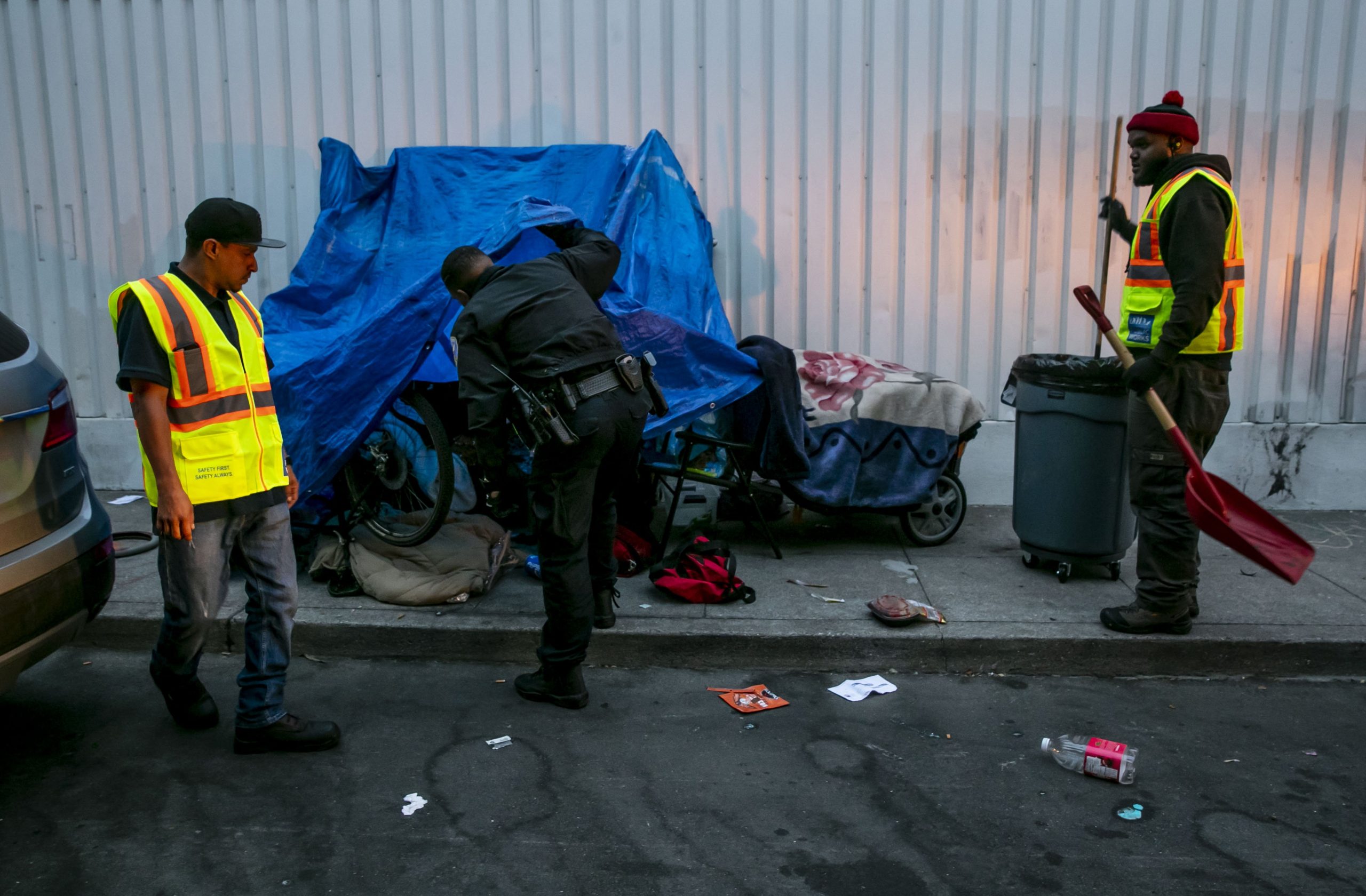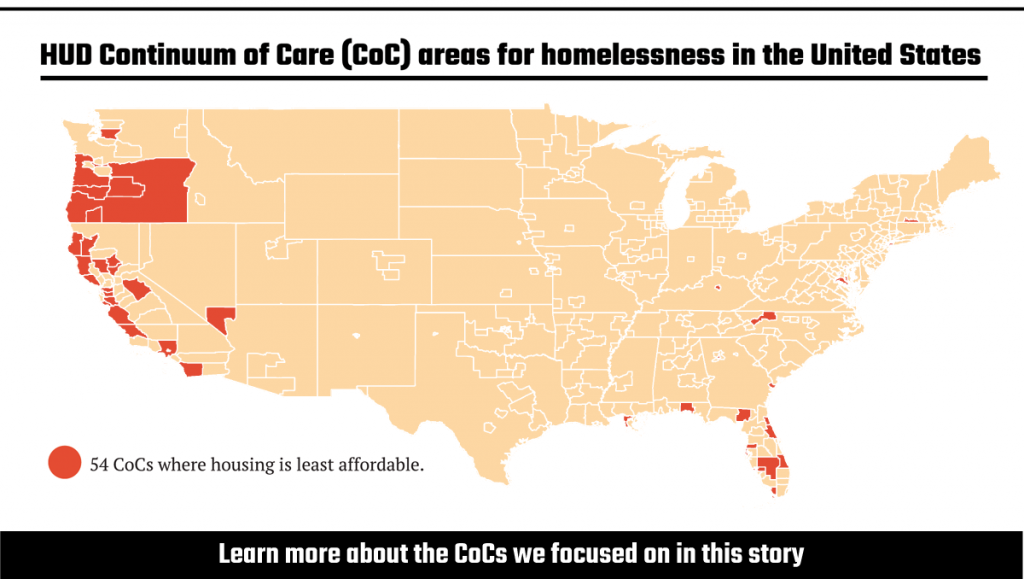By Ryan E. Little, Zack Demars, Nick McCool, Theresa Diffendal, Gina Scalpone, Aneurin Canham-Clyne and Riin Aljas
Published June 29, 2020
FORT WALTON BEACH, Fla. — In the nine years Kenneth Shultz has been homeless, he has spent one of every three nights in jail.
The 71-year-old retiree has been charged with trespassing 96 times, including after he fell asleep behind gas stations, outside office buildings and in a city park. His 1,033 days in jail have come with a crushing debt of $41,311 in court costs, fines and fees and an estimated taxpayer tab of nearly $50,000.
“I don’t do it on purpose,” says Shultz, who became homeless sometime around the beginning of 2011 but can’t remember why. “Sometimes I just get exhausted, and boom, sit down. That’s it. You’re trespassing.”
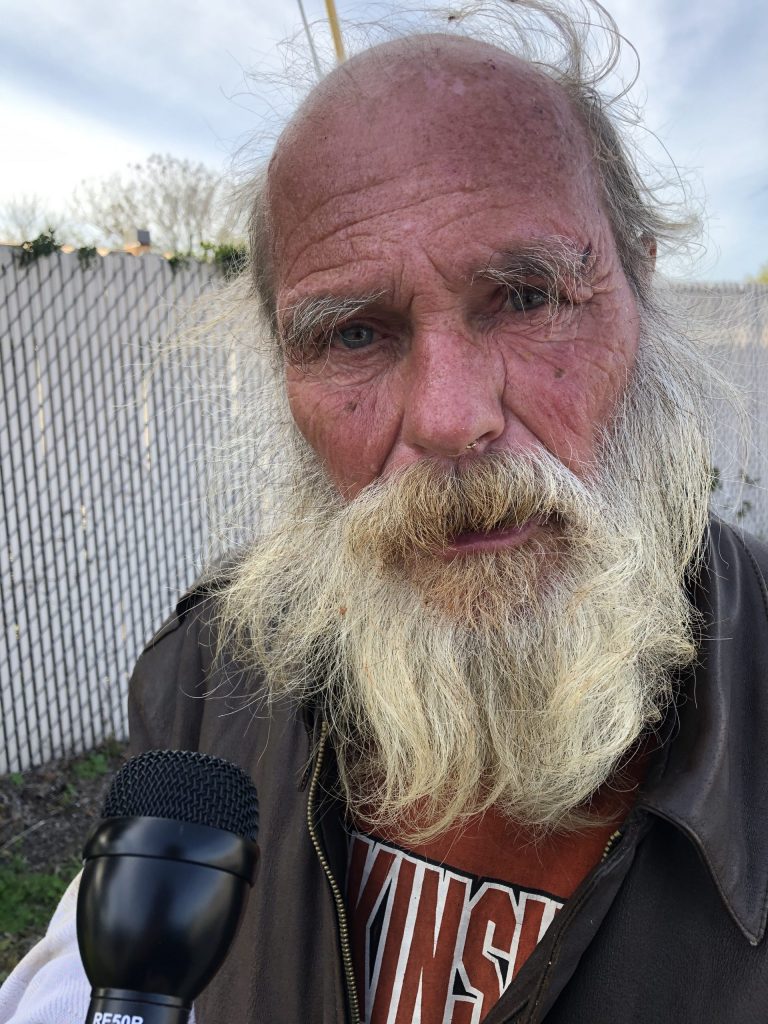
Police in Okaloosa County, an area with few emergency shelters, have charged hundreds of homeless people with thousands of trespassing counts in the past decade, an analysis of court data found.
Across the country, even in places where housing prices are out of reach and shelters are scarce, communities are trying to arrest their way out of homeless problems.
Cities have made it illegal to ask for money or food in public places, to sleep on a park bench, in a tent or car, or even to stand in one place too long. The laws create a cycle of arrests, hearings and unpaid fines that make emerging from homelessness all the more difficult.
In Eugene, Oregon, which has one of the nation’s highest rates of homelessness, one of every four people hauled into the city’s municipal court for nondriving offenses has lacked a permanent place to live. In Boston, the unhoused account for almost one of every eight arrests.
Each case can cost taxpayers thousands of dollars to pay for jail plus the hours worked by police officers, prosecutors, judges and other court staffers.
And those costs pile up because governments either haven’t figured out other ways to deal with homelessness, or because the alternatives they offer are inadequate. Rather than investing in affordable housing, emergency shelters, jobs and mental health programs, the communities are relying on law enforcement to deal with the homeless.
In the past, the federal government has argued against the use of arrests and jail time as a way to address homelessness. The U.S. Department of Justice, in a 2015 court filing, said “criminalizing homelessness is both unconstitutional and misguided public policy, leading to worse outcomes for people who are homeless and for their communities.”
But since then, the Trump administration has espoused expanding the role of law enforcement to rein in homelessness.
Some courts, hearing challenges to laws that criminalize the activities of people who live on the street, have sided with the homeless. For example, a federal appeals court last year ruled the government cannot prohibit sleeping outside if no shelter beds are available. Other courts have struck down laws against begging, ruling that those laws violate the First Amendment.
But when a court strikes down one law, cities just use a different one.
The arrests reflect intolerance for the half-million people across the country who have no home, at a time their ranks are expected to swell — one study predicts by as much as 45% — in the economic fallout from the COVID-19 pandemic.
The Howard Center for Investigative Journalism at the University of Maryland partnered with six university journalism programs to examine what happens when communities make homelessness a crime.
The consortium analyzed laws in 54 of the country’s least affordable areas — places like Eugene, Boston and Fort Walton Beach — where median rent is about a third or more of median income. That’s the point at which homeless rates rise sharply, according to a 2018 study.
All but one area had laws that penalized homeless people for trying to meet some of life’s basic necessities: sitting, sleeping, relieving themselves and acquiring money. Most had five or more.
Yet only one had enough shelters or emergency housing for the number of people needing them.
People with no place to go have, in effect, no place to be.
A costly solution
The number of people in the United States without a place to live has hovered above 550,000 people in recent years, according to a nationwide count conducted for the federal government one night each January.
The supply of temporary beds has not kept pace. Based on the 2019 count, the U.S. had 178,166 more homeless people than beds. That gap has widened by 29% since 2015.
It costs taxpayers roughly $129 to hold someone in jail overnight and homeless people can rarely pay bail, said Eric Tars, legal director for the National Law Center on Homelessness and Poverty. They may be incarcerated for weeks or even months awaiting trial, he said.
“It’s incredibly wasteful,” Tars said. “The prosecutor’s time, the judge’s time, the public defender’s time, the court staff time. It’s thousands of dollars every single time a homeless person gets arrested.
“All of that could easily pay for a month if not a year of putting that person into housing, finding a stable place to get a job or assistance.”
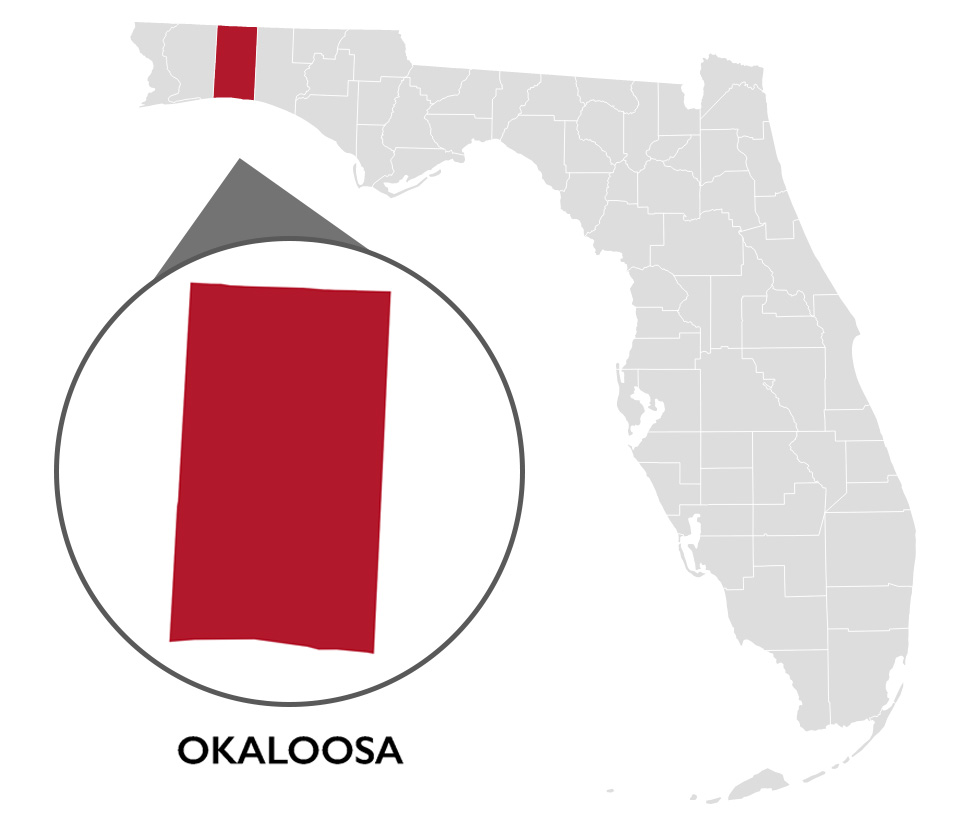
- Have been charged with trespassing 32 times
- Have been charged for missing court almost 4 times
- Owe $13,263 in cases that include a trespassing charge
- Spent 17 days in jail per charge
Data analysis by Riin Aljas and Ryan Little | Graphic by Camila Velloso
Police in Boston, Eugene and Fort Walton Beach said officers often attempt to divert the unhoused to a shelter or other services when possible — but some do not accept the help.
“You can’t narrowly look at it like a bunch of us folks just turning a blind eye and not being willing to help,” said Ginger Bowden Madden of Florida, who as assistant state attorney has prosecuted more trespassing cases than anyone else in Okaloosa County since 2010. “Some of us do not have the ability or the resources to help, short of taking them home with us. It’s frustrating and it’s heartbreaking.”
Black people are disproportionately impacted by criminalization, studies and statistics show. Nationally, 40% of all homeless people are Black, though they make up 13% of the U.S. population, according to the most recent federal count. They are more likely to be homeless because they are more likely to be poor, unemployed or earn lower incomes than white people, studies have shown.
A 2015 study in New Jersey found striking racial disparities in arrests for criminal trespass. That’s a charge police increasingly use against homeless people as courts have struck down anti-camping and panhandling laws. And a study two years ago found that Black people are arrested for vagrancy at twice the rate of white people.
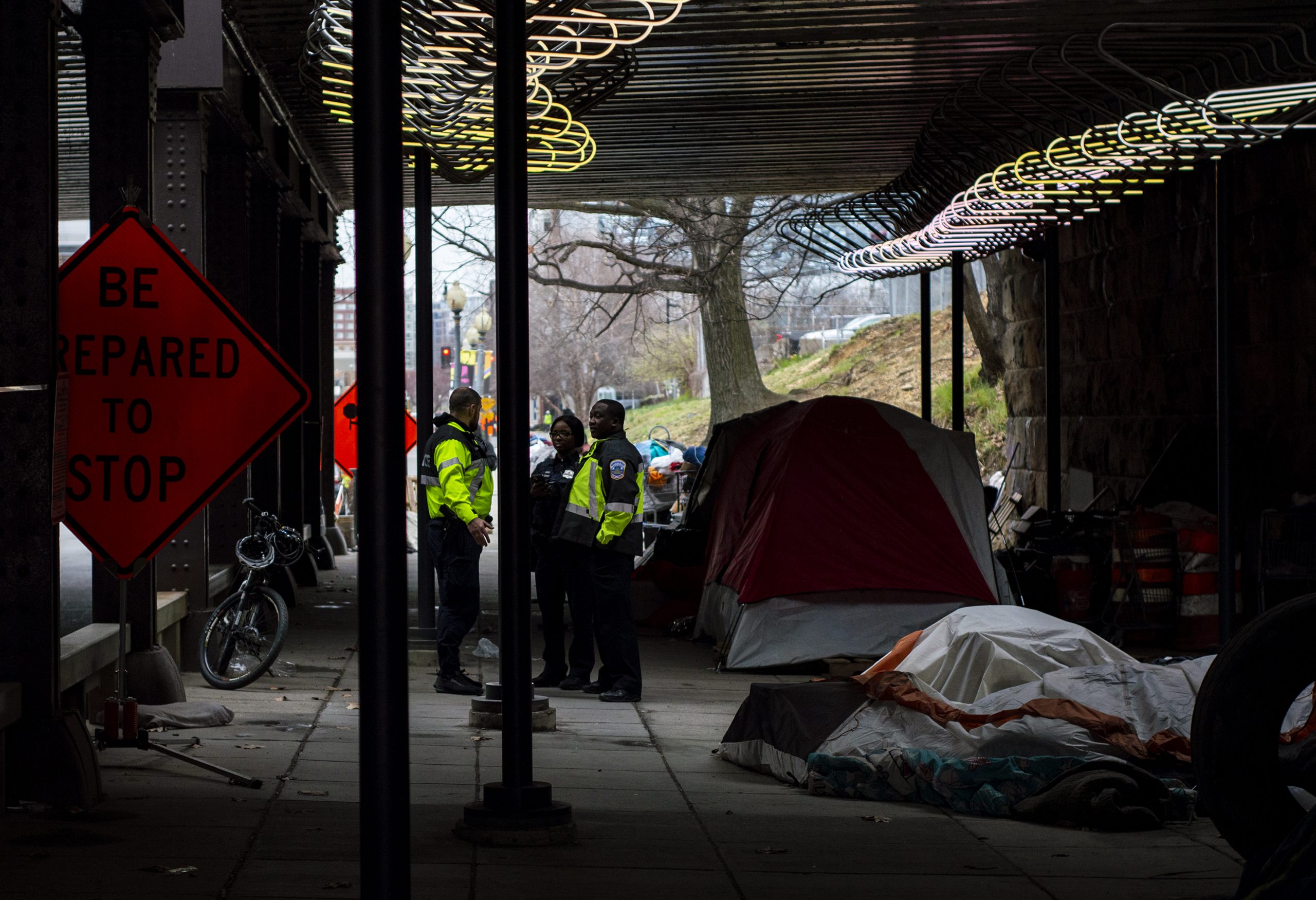
In Florida, for example, Black people represent 17% of the population but 37% of those charged with criminal trespass in the past 15 years, a Howard Consortium analysis of state court data found.
Not everyone charged with trespassing is homeless, but a spot check of the 50 defendants charged most often found that all had a history of homelessness. Eleven were Black, including the person with the most offenses — a 60-year-old man from Palm Beach County, who has been charged 139 times. (Okaloosa County’s Kenneth Shultz, who ranks 11th, is white.)
Protests of police brutality toward African Americans roiled the nation after the deaths of three African Americans at the hands of police. As politicians consider reform, they must include reforms that divest dollars from police departments and invest them in affordable housing, said Marc Dones, a consultant who advises governments on how to improve their homeless response systems with a focus on equity and antiracism.
“You can’t say to me that you want to uplift Black and brown voices on one hand, but then when it’s time to make material investments in things that would make the lives of Black and brown folks better, you’re not there,” said Dones, who is executive director of the National Innovation Service.
Tars said it isn’t enough for law enforcement to wish they had more options for repeat offenders. If police perceive injustice, they must speak against it.
“If they don’t want to have to take responsibility for it, then they need to be speaking out against it actively — not just feigning helplessness in the face of the system,” he said.
No place to sleep
The U.S. Interagency Council on Homelessness coordinates the federal response to helping the unhoused. In December, President Donald Trump replaced the agency’s head with Robert Marbut, who as a local government consultant encouraged cities to expand use of anti-panhandling laws and the threat of jail to coax people off the streets and into shelters.
The courts, however, have taken a more skeptical view of that approach.
An analysis of state and federal court data by the Howard Center Consortium identified more than 100 lawsuits filed against local governments in 23 states and the District of Columbia in the past 17 years by homeless people and their advocates.
Bans on panhandling and camping or sleeping in public places were among the most common reasons for suing.
Time and again, the courts have struck down the laws as unconstitutional.
They have found more than two dozen anti-panhandling ordinances in violation of the First Amendment since 2015, when the Supreme Court imposed strict limits on local government’s power to restrict speech based on its purpose or content.
“The First Amendment,” one federal judge wrote in striking down a panhandling ban in Lowell, Massachusetts, “does not permit a city to cater to the preference of one group, in this case tourists or downtown shoppers, to avoid the expressive acts of others, in this case panhandlers, simply on the basis that the privileged group does not like what is being expressed.”
Last year, the 9th U.S. Circuit Court of Appeals ruled that Boise, Idaho, could not enforce its camping and sleeping bans against homeless citizens if no alternative shelter was available.
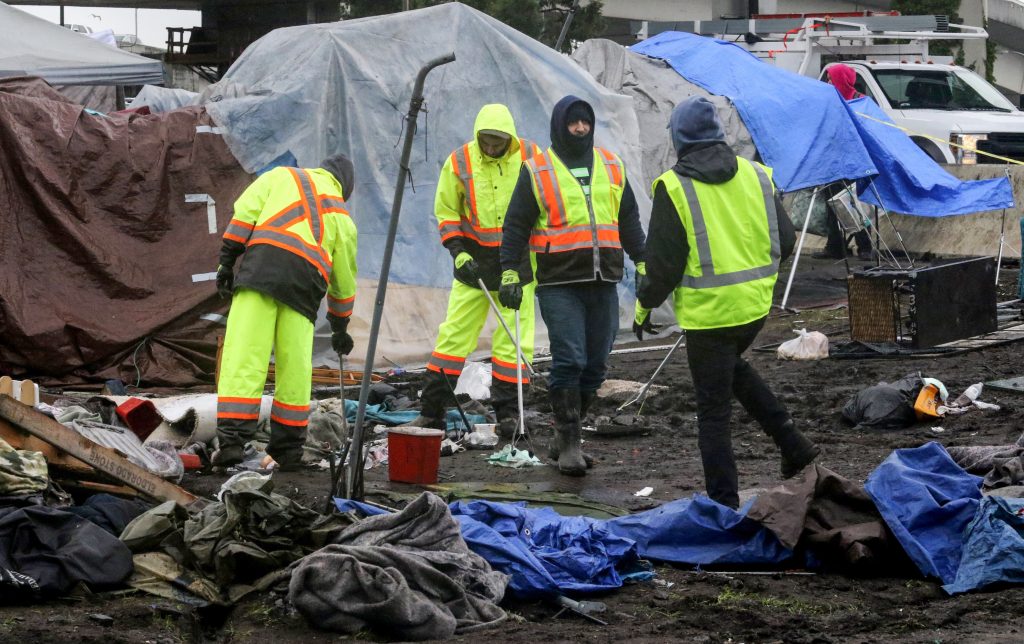
The lead plaintiff, Robert Martin, had fallen asleep in the bushes near a shelter in which his wife and son were staying. He told police he couldn’t get into any of Boise’s shelters. They charged him under the city’s anti-camping ordinance, a misdemeanor. The judge ordered him to pay about $150 in fines and court costs.
“As long as there is no option of sleeping indoors,” the 9th Circuit majority opinion said, “the government cannot criminalize indigent, homeless people for sleeping outdoors, on public property, on the false premise they had a choice in the matter.”
Boise appealed to the U.S. Supreme Court, which declined to review the case, giving the decision the force of law in the nine Western states within the 9th Circuit’s boundaries, where 67% of the nation’s unsheltered population lives. They include the four states with the highest unsheltered homeless rates: California, Oregon, Hawaii and Nevada.
Even so, laws against begging and sleeping remain widespread in U.S. communities — and at least 37 states have enacted statewide prohibitions on begging, camping or loitering, according to an analysis of survey data from a forthcoming report from the National Law Center on Homelessness and Poverty.
That doesn’t include criminal trespass laws, which are widespread and frequently used by police to arrest homeless people. They are tougher to challenge, legal advocates say, because they make a person’s location the crime rather than what they are saying or doing.
Lane County, Oregon, home to Eugene, has seen its homeless population increase by nearly 50% in the past five years, creating one of the highest rates of homelessness for cities of its size in the U.S. City officials and police say that helps explain why the unhoused end up in court and cuffs more often.
Trespassing cases have increased at a faster rate — 80% over that same time period — with an increasing burden on the unhoused. Last year, police recorded 2,077 trespassing charges, exceeding the number of speeding tickets they handed out.
Howard Consortium reporters analyzed a random sample of 360 trespassing cases in Eugene last year and found that 75% of the defendants lacked a permanent address. That’s up from 60% three years earlier, the city’s municipal court records show.
In most cases, police were called to businesses, coffee shops, churches or the city library in response to a complaint alleging the person refused to leave or was creating a disturbance.
But about 30% involved tickets or arrests that police initiated, usually after spotting a homeless person sitting, camping or sleeping on private property. Police say they have no choice but to bring a charge if the property has a “no trespassing” sign and the owner has authorized them to act even without receiving a complaint.
The city’s municipal court has tried a community court alternative that allows defendants to have their charges waived if they engage in services and stay out of trouble. But the program is dwarfed by the scale of the problem: The community court has dismissed fewer than 4% of the trespassing charges booked by police in the past three years.
Eugene Police Chief Chris Skinner said his officers face a dilemma driven by the many people living on the street who don’t want the help that’s offered, and by a lack of services for those who do.
“We haven’t built that creative capacity to do something other than the traditional criminal justice system,” Skinner said.
“It’s tough — all the tools that we’ve come up with or all the creative strategies we come up with need to have some kind of resource that supports it.”
Boston prohibits sleeping, lying down or drinking in public places, as well as vagrancy and begging. More often, police arrest homeless people on drug, theft or disorderly conduct charges, Police Department data show. But the leading charge is trespassing.
The Massachusetts Supreme Judicial Court ruled in 2016 that homeless individuals in that state who are charged with criminal trespassing can raise necessity as a legal defense. That allows jurors to acquit a defendant when following the law would do more harm than breaking it.
The case involved David Magadini, a 67-year-old homeless man who was sentenced to a month in prison for trespassing in various residential and commercial buildings on bitterly cold nights in Great Barrington, a resort town in the Berkshires. Magadini had previously been denied access to emergency shelter.
Quoting an 1834 Massachusetts sailor mutiny case, the court said the potential inconvenience to the private property owners, managers or residents was minimal compared to Magadini’s life.
“Our law,” the court said, “does not permit punishment of the homeless simply for being homeless.”
Rulings on use of trespass laws against homeless people are still relatively rare — legal advocates called it the “new frontier.” This decision applies only to Massachusetts, and it appears to have had limited impact even there. In the four years since the decision, police data show, more than one in 10 arrests of homeless people in Boston has been for trespass.
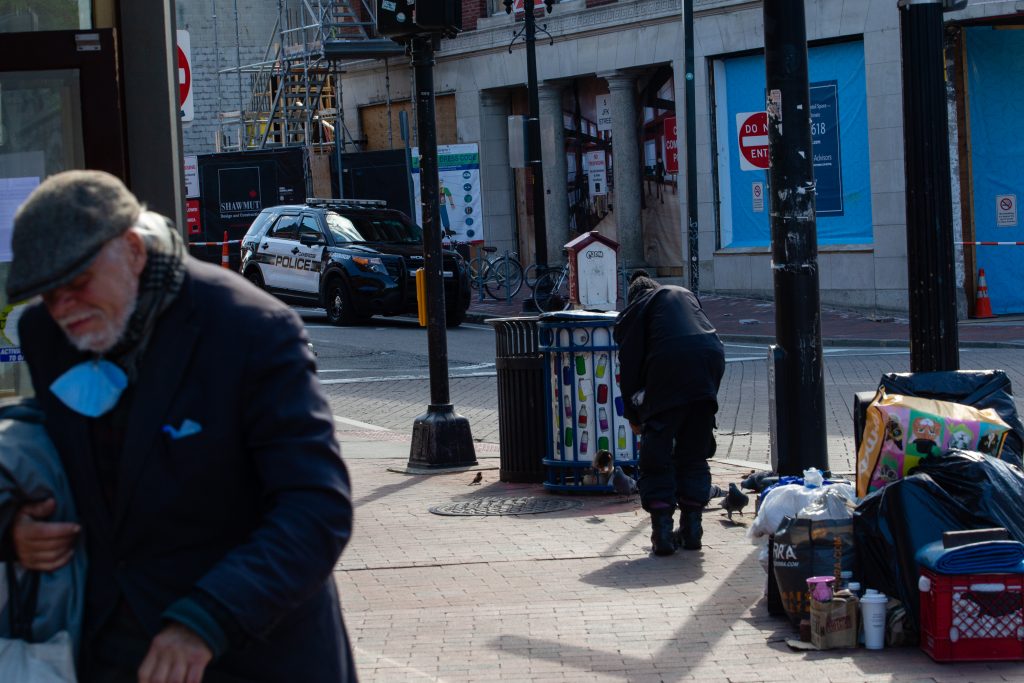
Boston Police Sgt. Detective John Boyle, the department’s spokesperson, said many of the arrests involve multiple charges, with trespass listed as first on the booking sheet.
“We have discretion as police officers,” Boyle said, adding that most trespass arrests involve people refusing a police order to move. “If someone is sleeping on a public sidewalk, they may not be arrested for trespassing. We would do the humane thing. They would be transported to a shelter or a hospital.”
No place to be
In Florida, where the courts have repeatedly found that state and local anti-panhandling laws violated the First Amendment, several cities have hired Melbourne attorney Michael Kahn to help their ordinances avoid the same fate.
Kahn said he designs them to target the conduct of panhandlers, not their speech.
“I’m not attempting to regulate homelessness,” Kahn said. “I’m not attempting to prohibit it, encourage it or anything. I’m regulating panhandling.”
Daytona Beach paid him $30,000 in July 2018 to draft an ordinance that prohibits panhandling within 2 feet of the person being solicited, 20 feet of a business entrance, bus stop, parking meter, public parking lot or public restroom, and 150 feet of intersections with traffic signals. The list continues: No begging along the boardwalk or at taxi stands, playgrounds and waiting lines. Violators face up to 60 days in jail and $500 in fines.
“This article is not intended to limit any persons from exercising their constitutional right to panhandle,” the ordinance reads, but rather “to protect citizens from the fear and intimidation accompanying certain kinds of panhandling and begging that have become an unwelcome and overwhelming presence in the city by prohibiting aggressive panhandling and begging.”
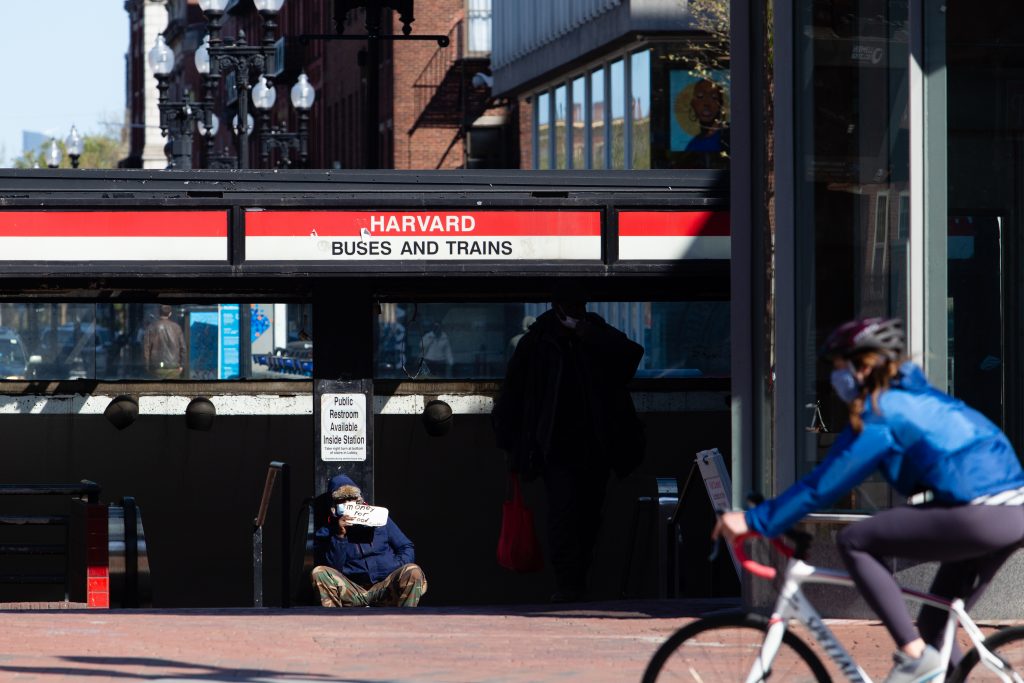
Jackie Azis, staff attorney with the Florida American Civil Liberties Union, said the passage does not make the ordinance constitutional. The courts “have been unequivocal that the First Amendment protects panhandling,” she said. “Daytona Beach is one of those problem cities where they’ve been warned about this, and yet the reports are they continue to arrest people.”
Under another city program, 540 businesses and property owners in Daytona Beach have authorized police to arrest anyone found on their land outside of posted hours.
That can leave few options for sleeping at night. According to last year’s federal count, there were just 509 year-round beds for 875 homeless people in the area.
Messod Bendayan, a public information officer with the City of Daytona Beach Police Department, said the city is not criminalizing homelessness.
“I would say, in theory, they’re not being arrested for being homeless. They’re being arrested for trespassing,” Bendayan said.
In Florida, where 5% of the nation’s homeless reside, trespassing charges are on the rise in many of its coastal communities. In Volusia County, where Daytona Beach is located, they have risen 38% since 2014, an analysis of court data found.
Okaloosa County’s charges are up 24%. Police there have lodged more than 2,000 trespassing charges against some 500 homeless people in the past decade. The fines and fees, which few are likely able to pay, total almost $1 million.
Between jail stints in Okaloosa County, Kenneth Shultz sleeps in a hotel room, when he can afford it. Otherwise, he has to find a place outside to throw his dirt-stained, purple blanket. Sometimes it is an old Kmart parking lot, near two minimarts where he can get Bud Ice, cheap cigarettes and prepackaged ice cream cones.
He doesn’t remember how he became homeless, but there’s a lingering self who wakes up every day surprised to find himself sleeping on the street.
“I never, ever thought I’d ever be on the street,” he said.
He recalls that he operated a dry cleaning business in Fort Walton Beach in the 1990s, eventually sold it, retired and then lost much of his savings gambling at the casinos in Biloxi, Mississippi.
He remembers living in a house in the greater Fort Walton Beach area some years ago. He remembers going for a walk, but he doesn’t remember where he went. He doesn’t remember going back. He doesn’t remember if he could go back.
Records show he was served with an eviction notice in December 2010 from a home in nearby Shalimar, Florida, where he had lived for 15 years. His first trespassing charge in court records is April 2011, when a police officer found him sleeping in a vacant lot.
Like Florida as a whole, Okaloosa and Walton counties come up short of shelter beds — just 84 beds year-round for 399 homeless people, according to the 2019 homeless count.
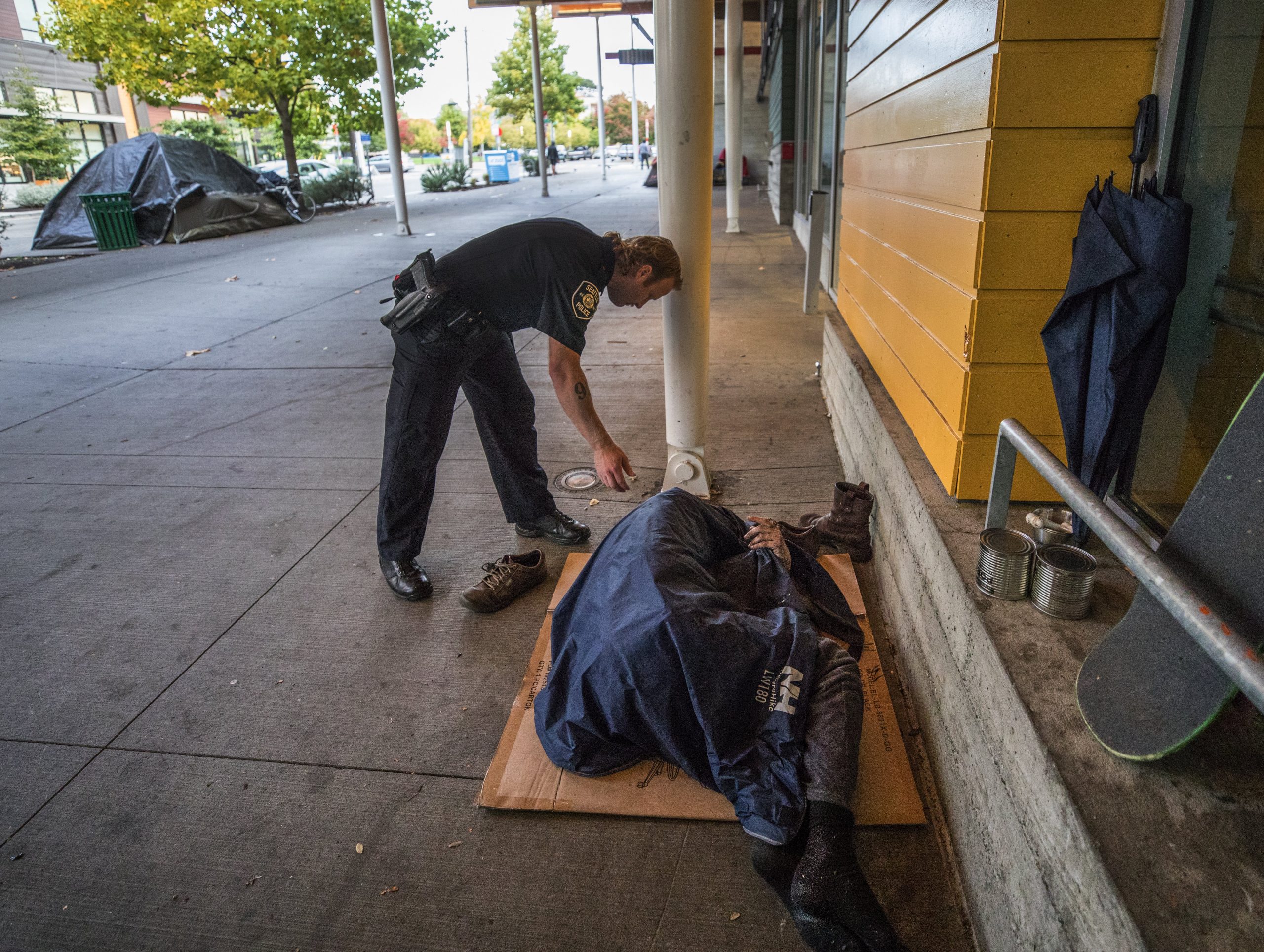
Shultz said the waiting list for a regular spot is “gigantic” at One Hopeful Place, a 20-bed shelter in a converted wastewater treatment plant on the outskirts of Fort Walton Beach. Construction on a 75-bed addition is underway and expected to be completed in July.
Madden, the prosecutor from Okaloosa County, said with defendants like Shultz prosecutors don’t have leeway to do much more than ask the judge to limit the sentence to time served in jail after arrest and allow those convicted to work off their fines through community service at minimum wage.
“I know that the numbers look bad,” Madden said. “But from the inside looking out of the court and of the prosecutor’s office, I feel like we have done as compassionate a job as we have the legal authority to do.”
The daughter of legendary former Florida State University football coach Bobby Bowden, Madden is running unopposed in the November election for state attorney in the circuit that includes Okaloosa.
As state attorney, Madden said she could work with officials to divert mentally ill individuals to treatment programs rather than arrest them for petty, nonviolent crimes like trespassing.
Fort Walton Beach Police Chief Robert Bage says not everyone wants help, and he must weigh the rights of property owners against the rights of homeless people. “There are some people that just have to see that there are consequences,” he said.
Shultz said he doesn’t view the police as adversaries.
“There’s nothing wrong with them,” he said. “And most of them give me about three warnings and I keep forgetting them. They say, ‘You can’t forget everything.’ I say, ‘I do.’ ”
The Okaloosa County Sheriff’s Office arrested Shultz for trespassing on March 6, when they found him resting behind a dumpster at a gas station. They reminded him that he had been warned to stay away, records show. Three days later, they arrested him again at the same gas station.
“They’re like, ‘Why are you out here?’ ” Shultz said. “There is no other place to be.”
Christine Condon, Lillian Eden, Bryan Gallion, Lukas Hanson, Julia Lerner, Clara Longo de Freitas, Maya Pottiger, Callie Tansill-Suddath and Brenda Wintrode contributed to this story.
Lead photo: A San Francisco Public Works crew and police wake up tent residents living along Division Street in September 2018. The homeless people were asked to move their belongings to clean the city streets and keep them free of tents. (Erika Schultz/The Seattle Times)
The Seattle Times graciously provided file photos to the Howard Center for this project after student journalists were barred from site visits in March.

